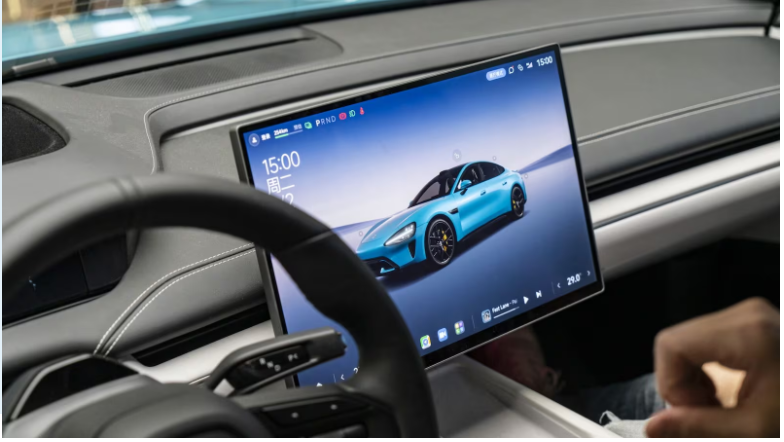
Autonomous driving and artificial intelligence are the buzzwords at this week’s Guangzhou auto show the last major gathering of Chinese carmakers for the year. With Elon Musk’s Tesla Inc. aiming to bring what it markets as full self-driving to China in the first quarter of next year, pending regulatory approval, domestic electric car manufacturers are telling customers that their advanced driving-assistance services which can navigate highways or busy city streets are coming very soon, if they’re not already here.
Last week, Xiaomi Corp. Chariman Lei Jun conducted a livestream test drive of the SU7 EV going from parking spot to parking spot. The feature, to be trialed with a select group of owners and media, is inspired by Tesla’s FSD end-to-end technology, which uses cameras and large AI models to make real-time driving decisions, rather than relying on engineers to code rules to simulate driving, Lei said. Parking spot to parking spot means starting from a parking spot to the one at the destination, using smart driving the whole way, Lei said during the livestream. This technology is magical. It’s also the most advanced technology in assisted-driving today. It was first released by Tesla in the US in January. Our peers in China all have started to try to catch up in this new frontier. Xiaomi is in a relatively leading position in this field.
Although the safety and reliability of driver assistance systems are still in question with lawsuits and a US federal probe being mounted into Tesla’s Autopilot and FSD systems many in the industry are betting on autonomous-driving technology as the future of mobility and are racing to stay ahead of competitors in the field.
Indeed, Musk has staked Tesla’s future on solving self-driving. He last month unveiled the prototype Cybercab, though admitted the robotaxi which has no steering wheel or pedals will likely only go into production in 2026 at the earliest.
Chen Qi, who joined Zeekr in 2021 after running Huawei Technologies Co.’s autonomous driving unit, said that while Tesla’s FSD will put pressure on Chinese EV makers, it’s a good thing as it will promote more competition and innovation. And China’s homegrown engineers are more than capable of coming up with good technology, he said.
China’s talent in algorithms or software is more abundant than what’s found in some other countries, Chen said. Looking globally at those who are working on intelligent driving, other than Chinese companies, the most advanced is Tesla.
And China has unique road conditions and regulatory requirements, so when Tesla enters the market next year, it may not adapt straightaway. Search giant Baidu Inc. and Geely’s joint venture Jidu Auto, also known as Jiyue in China, has pushed the envelope and applied AI to their electric hypercar, the Robo X. The racer can accelerate from 0 to 100k/hr in just 1.9 seconds and has a range of 650 kilometers (403 miles) on a single charge.
The Robo X is almost like an experiment to be able to push the boundaries for the future of AI autonomous driving and also the AI experience for any mobility products, Frank Wu, the head of design at Jidu, said at the auto show over the weekend.
Xpeng Inc., Li Auto Inc. and Great Wall Motor Co. were among other carmakers who unveiled their latest intelligent driving offerings at the show, which runs in Guangzhou until Nov. 24. Faster speed, more accuracy, better electric output efficiency, better aerodynamics and driving balance, Wu said. AI an make cars do everything better.


